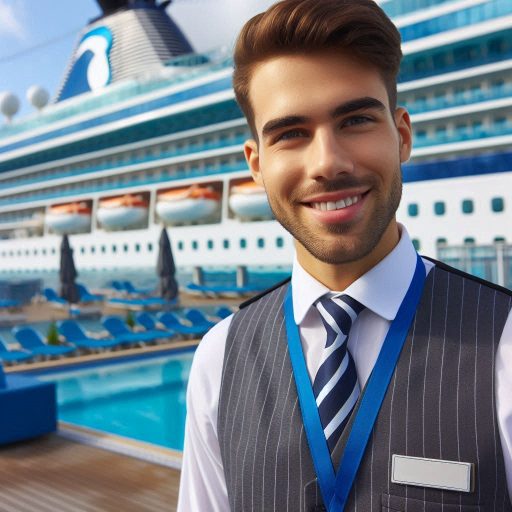Introduction
In the vibrant and thriving cruise ship industry, there is a diverse range of roles that make up the staff onboard.
From the captain steering the ship to the housekeeping staff ensuring cabins are pristine, each role contributes to the smooth operation of the cruise.
- Captain: The captain is responsible for the overall operation of the ship, including navigation, safety, and overseeing the entire crew.
- Deck Officers: Deck officers assist the captain in navigating the ship, maintaining safety protocols, and managing the deck crew.
- Engine Staff: The engine staff is crucial for ensuring the ship’s mechanical systems are running smoothly, including propulsion and electrical systems.
- Medical Staff: Medical staff onboard include doctors and nurses who provide medical care to passengers and crew in case of emergencies or illnesses.
- Entertainment Staff: Entertainment staff organize and host events, shows, and activities onboard to keep guests entertained throughout their journey.
- Housekeeping Staff: Housekeeping staff are responsible for cleaning, tidying, and maintaining cabins and public areas to ensure a comfortable and hygienic environment for guests.
- Restaurant Staff: Restaurant staff work in onboard restaurants, bars, and cafes, taking orders, serving food and beverages, and providing exceptional customer service.
- Shop Staff: Shop staff manage onboard shops, assisting guests with purchases, stocking shelves, and handling transactions in duty-free shops and boutiques.
- Purpose of the Blog Post: This blog post aims to provide insight into the various roles within the cruise ship staff, highlighting the importance of each position in creating a memorable experience for passengers.
Captain
Being the captain of a cruise ship comes with a wide range of responsibilities and duties that are crucial to the successful operation of the ship.
Responsibilities and Duties of the Captain
- Navigation and steering the ship to its destinations.
- Ensuring the safety and security of passengers and crew.
- Overseeing all onboard operations and activities.
- Making decisions in emergency situations.
- Managing the crew and maintaining discipline.
- Interacting with passengers and addressing their concerns.
Qualifications Required to Become a Captain
- Hold a valid captain’s license issued by the relevant maritime authority.
- Have several years of experience working on ships of increasing responsibility.
- Complete specialized training in navigation, safety, and emergency procedures.
- Demonstrate strong leadership and decision-making skills.
- Possess excellent communication and interpersonal skills.
Importance of Leadership Skills in this Role
Leadership skills are crucial for a captain as they are responsible for the safety and well-being of everyone onboard the ship.
The captain must be able to make quick decisions, manage crises, and inspire confidence in their crew and passengers.
Strong leadership skills also help the captain to effectively delegate tasks, motivate the crew, and maintain order in emergency situations.
Overall, the captain’s leadership sets the tone for the entire ship and plays a vital role in ensuring a successful and enjoyable cruise experience for all.
Read: Best Resources for Aspiring Service Industry Pros
Cruise Director
Role of the cruise director in entertaining and engaging passengers
The cruise director plays a crucial role in ensuring that passengers have an enjoyable and memorable experience onboard the ship.
They are responsible for planning and overseeing all entertainment activities and events to keep passengers engaged throughout their voyage.
From organizing themed parties to hosting trivia nights, the cruise director is the mastermind behind keeping passengers entertained.
Daily schedule and tasks of a cruise director
A typical day for a cruise director starts early in the morning, as they need to plan and prepare for the day’s activities.
They need to oversee the entertainment staff, coordinate with onboard vendors for any special events, and ensure that all activities run smoothly.
Throughout the day, the cruise director will host various events, lead activities, and interact with passengers to ensure their satisfaction.
In the evening, they may host shows or performances before retiring for the day.
Skills needed to excel in this position
To excel as a cruise director, one needs to possess a combination of skills, including exceptional communication and interpersonal abilities.
They must be outgoing, energetic, and enthusiastic, as they will be the face of the entertainment onboard.
Strong organizational skills are also crucial, as the cruise director needs to juggle multiple tasks and events simultaneously.
Additionally, creativity and the ability to think on your feet are valuable traits for a successful cruise director.
Read: Essential Skills for Aspiring Hair Stylists
Transform Your Career Today
Unlock a personalized career strategy that drives real results. Get tailored advice and a roadmap designed just for you.
Start NowHousekeeping Staff
Importance of cleanliness and organization on a cruise ship
Maintaining a high level of cleanliness is crucial for the overall guest experience.
Ship hygiene is vital to prevent the spread of illnesses and ensure a safe environment.
A clean ship also contributes to a positive reputation and guest satisfaction ratings.
Roles and responsibilities of the housekeeping staff
Housekeeping staff members are responsible for cleaning and maintaining guest rooms.
They change bed linens, replenish toiletries, vacuum carpets, and dust surfaces.
In addition to guest areas, they also clean and maintain crew quarters and public spaces.
They work diligently to ensure all areas of the ship meet sanitation standards.
Challenges faced by housekeeping staff members
One major challenge is the tight turnaround between guests checking out and new guests checking in.
Housekeeping staff must work efficiently to ensure all rooms are cleaned promptly.
Dealing with a high volume of rooms can be physically demanding and require stamina.
They must also adapt to irregular work hours and potential seasickness while performing tasks.
Read: Maximizing Tips and Earnings as a Tour Guide

Food and Beverage Staff
Working in the food and beverage department on a cruise ship can be an exciting and rewarding experience.
There are different roles within this department, each playing a crucial part in providing excellent service to cruise ship guests.
Let’s take a closer look at the responsibilities and experiences of food and beverage staff onboard.
Roles within the Food and Beverage Department
- Waiters/Waitresses: Responsible for taking orders, serving food, and attending to guests’ needs during meal times.
- Bartenders: Prepare and serve drinks at the various bars and lounges throughout the ship. Must have knowledge of cocktails and be able to engage with guests.
- Buffet Attendants: Oversee the buffet areas, ensuring food is stocked, fresh, and presented attractively for guests.
- Sommeliers: Wine experts who assist guests in selecting the perfect wine to accompany their meals.
Importance of Customer Service
Providing exceptional customer service is key in the food and beverage department.
Guests expect to have a memorable dining experience during their cruise, and it is up to the staff to meet and exceed those expectations.
Being friendly, attentive, and knowledgeable about the menu are essential qualities for success in this department.
Work Environment and Hours
Working in the food and beverage department can be demanding, as the hours are often long and the work environment fast-paced.
Showcase Your Business Today
Reach thousands of readers actively exploring professional services. Publish your business profile and grow your audience now.
Publish NowStaff are typically required to work in shifts, with some positions requiring late-night hours.
However, the reward of creating unforgettable dining experiences for guests makes it all worth it.
In short, food and beverage staff play a vital role in ensuring guests have a wonderful dining experience while on a cruise.
From waiters and bartenders to sommeliers and buffet attendants, each member of the team contributes to the overall satisfaction of guests.
Providing exceptional customer service in a fast-paced environment can be challenging, but the reward of creating unforgettable memories for guests is truly fulfilling.
Read: Medical Staff on Cruise Ships: Roles and Duties
Entertainment Staff
Types of Entertainment Staff on a Cruise Ship
There are various types of entertainment staff on a cruise ship, including dance instructors, DJs, singers, comedians, and activity hosts.
Each staff member plays a crucial role in ensuring passengers have an enjoyable and memorable experience during their cruise.
From organizing themed parties to hosting game nights, entertainment staff are responsible for creating a lively and fun atmosphere on board.
Responsibilities of Entertainment Staff
The primary responsibility of entertainment staff is to plan and execute a variety of activities and events for passengers of all ages.
This may include coordinating live music performances, organizing trivia contests, leading dance classes, and hosting karaoke nights.
Entertainment staff must be energetic, outgoing, and engaging in order to interact with passengers and keep them entertained throughout the cruise.
Training and Qualifications Required
While formal education is not always required, most cruise lines prefer candidates with a background in performing arts, hospitality, or event planning.
Specific training programs and certifications may be provided by the cruise line to ensure entertainment staff are equipped with the necessary skills.
Strong communication and interpersonal skills are essential, as well as the ability to work well under pressure and adapt to changing schedules and demands.
Prior experience in entertainment or customer service is often a plus, as it demonstrates the candidate’s ability to engage with guests and create memorable experiences.
Overall, entertainment staff play a vital role in enhancing the cruise experience for passengers by providing a wide range of entertainment options and activities to enjoy throughout their voyage.
Safety Officer
In the fast-paced environment of a cruise ship, safety is of utmost importance.
The safety officer plays a crucial role in ensuring that passengers and crew members are kept safe at all times.
Importance of Safety on a Cruise Ship
- Preventing accidents and injuries
- Responding to emergencies effectively
- Complying with maritime safety regulations
- Maintaining a safe and secure environment for everyone on board
As the first line of defense in case of emergencies, the safety officer must be well-trained and prepared to handle any situation that may arise.
Duties and Responsibilities of the Safety Officer
- Conducting safety drills and training sessions for crew members
- Inspecting and maintaining safety equipment on board
- Developing and implementing safety policies and procedures
- Investigating incidents and accidents to prevent future occurrences
The safety officer must also ensure that the ship complies with international safety standards set by organizations such as SOLAS (Safety of Life at Sea).
Training and Certifications Needed to Work in This Role
- STCW Basic Safety Training Certification
- Emergency Response and Crisis Management Training
- Previous experience in maritime safety or a related field
- Knowledge of international maritime regulations and guidelines
In addition to formal training and certifications, the safety officer must possess strong leadership skills, attention to detail, and the ability to remain calm under pressure.
Medical Staff
Role of the Medical Staff
Medical staff on a cruise ship play a crucial role in providing healthcare services to both passengers and crew members.
They are responsible for treating illnesses, injuries, and emergencies that may occur during the voyage.
Medical Qualifications Needed
Individuals working as medical staff on a cruise ship are typically required to hold a medical degree, along with relevant certifications in emergency medicine and basic life support.
Having experience in a clinical setting is also beneficial.
Challenges Faced by Medical Staff
Working as medical staff on a cruise ship comes with its own unique set of challenges.
One of the main challenges is limited access to medical resources and facilities compared to a land-based hospital.
Medical staff must be prepared to handle a wide range of medical conditions with limited resources.
Another challenge is the high demand for medical services on a cruise ship.
Medical staff may have to work long hours and deal with a large volume of patients, especially during outbreaks of illnesses such as norovirus.
Additionally, medical staff on a cruise ship must be able to adapt to the constantly changing environment of the ship.
They may have to treat patients in cramped quarters or in challenging weather conditions, which can test their skills and resourcefulness.
Communication can also be a challenge for medical staff on a cruise ship, as they may have to overcome language barriers with patients and coordinate care with medical facilities on land in case of a more serious emergency.
Overall, the role of medical staff on a cruise ship is demanding and requires individuals with specialized medical training and skills.
Despite the challenges they face, medical staff play a vital role in ensuring the health and well-being of passengers and crew members during their time at sea.
Conclusion
Working on a cruise ship is no easy task. Let’s delve into the various roles and responsibilities of the staff members on board.
Responsible for cleaning and maintaining the cabins for passengers, ensuring a comfortable stay.
Serving food and beverages in the onboard restaurants, providing excellent customer service to guests.
Organizing and hosting onboard activities and shows to keep passengers entertained throughout their voyage.
Showcase Your Business Today
Reach thousands of readers actively exploring professional services. Publish your business profile and grow your audience now.
Publish NowProviding medical assistance and care to passengers and crew members in case of emergencies or illnesses.
Responsible for maintenance tasks on the deck, such as cleaning and ensuring the safety of passengers.
Assisting passengers with any inquiries or issues they may have during their cruise, ensuring customer satisfaction.
Ensuring the safety and security of passengers and crew members, monitoring onboard activities and responding to any incidents.
Working in the ship’s kitchen to prepare meals for passengers and crew members, ensuring high-quality food service.
Each member of the cruise ship staff plays a crucial role in ensuring a smooth operation.
Their hard work, dedication, and teamwork are essential for providing passengers with a memorable and enjoyable experience on board.
Next time you embark on a cruise, don’t forget to appreciate the efforts of these unsung heroes behind the scenes.
[E-Books for Sale]
The Big Book of 500 High-Paying Jobs in America: Unlock Your Earning Potential
$19.99 • 500 High-Paying Jobs • 330 pages
Explore 500 high-paying jobs in America and learn how to boost your career, earn more, and achieve success!
See All 500 High-Paying Jobs of this E-Book
1001 Professions Without a Degree: High-Paying American Jobs You Can Start Now
$19.99 • 1001 Professions Without a Degree • 174 pages
Discover 1001 high-paying jobs without a degree! Unlock career tips, skills, and success strategies for just $19.99!




